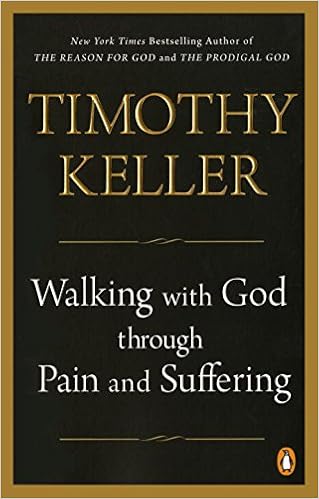 “The other side of the sovereignty of God is the suffering of God . . . the main reason that Christians insist God can be trusted in the midst of suffering is that . . . God himself has firsthand experience of suffering.”
“The other side of the sovereignty of God is the suffering of God . . . the main reason that Christians insist God can be trusted in the midst of suffering is that . . . God himself has firsthand experience of suffering.”

https://www.amazon.com/Walking-God-through-Pain-Suffering/dp/1594634408/ref=sr_1_1?s=books&ie=UTF8&qid=1486412720&sr=1-1&keywords=walking+with+god+through+pain+and+suffering+by
+timothy+keller#reader_1594634408
With this astonishing proclamation, Timothy Keller begins Chapter Seven of Walking with God through Pain and Suffering.
Astonishing. First, because the sovereign God can suffer. Second, because he chose to suffer for us. Sadly, we’ve become so familiar with the suffering God that we’re barely moved.
Already in Genesis 6:5,6, God is shown to suffer. “The Lord saw how great the wickedness of man had become . . . The Lord was grieved that he had made man on the earth, and his heart was filled with pain.” Can we imagine God grieved and in pain? Here’s more . . .
THE SUFFERING OF GOD THE SON
The Gospels depict Jesus suffering life’s ordinary pains. These climax beyond comprehension at the cross. His suffering echoes in his poignant cry, “My God, my God, why have you forsaken me?” Scottish preach Robert Murray M’Cheyne commented . . .
He was without any comforts of God—no feeling that God loved him—no feeling that God pitied him—no feeling that God supported him. God was his sun before—now that sun became all darkness . . . He was without God—he was as if he had no God. All that God had been to him before was taken from him now . . . . He had the feeling of the condemned . . . Ah! This is the hell that Christ suffered. The ocean of Christ’s sufferings is unfathomable (p. 150,151).
And M’Cheyne writes, the answer to Jesus’ question is: “For us.”
THE SUFFERING SOVEREIGN
Keller insists we must hold both truths as complementary—God suffers and remains sovereign. This is what makes his suffering so astonishing: he suffers voluntarily, motivated by love.
Peter Berger, Austrian-American sociologist says . . .
If God is no exception—if even he has suffered—then we cannot say he doesn’t understand, or that his sovereignty over suffering is being exercised in a cruel and unfeeling way, or that he is a cold king who lets things happen without caring about what we’re going through (p. 153).
For that reason, we can be assured that our suffering always has purpose. As a child who trusts his parent without understanding the reason for her actions, so we can trust God. He earned our trust at the cross.
EVIL’S FINAL DEFEAT
The difficult-to-interpret Book of Revelation speaks clearly about suffering and evil. “ . . . the souls of those who had been slain because of the word of God and the testimony they had maintained” (Revelation 6:9) cry out for justice, “How long, Sovereign Lord, holy and true, until you judge the inhabitants of the earth . . . “ (Revelation 6:10)?
Keller observes that by judgment we can punish evil, but not undo it. Yet, as Revelation envisions great judgments, it moves beyond toward the renewal of all things—renewal that springs from the worst evil could do against God at the cross. Yet God used that evil to bring about the greatest good. Divine irony!
Theologian Henri Blocher writes: “God entraps the deceiver in his own wiles. Evil, like a judoist {tries to] take advantage of the power of the good, which it perverts; the Lord, like a supreme champion, replies by using the very grip of the opponent” (p. 157).
True, Christianity doesn’t offer a full explanation for every instance of suffering. But it does give a final answer to it! Dostoevsky, the Russian author and philosopher, wrote . . .
I believe like a child that suffering will be healed and made up for, that all the humiliating absurdity of human contradictions will vanish like a pitiful mirage, like the despicable fabrication of the impotent and infinitely small Euclidean mind of man, that in the world’s finale, at the moment of eternal harmony, something so precious will come to pass that it will suffice for all hearts, for the comforting of all resentments, for the atonement of all the crimes of humanity, of all the blood that they’ve shed; that it will make it not only possible to forgive but to justify all that has happened (p. 158).
And John, the Spirit-inspired writer of Revelation wrote . . .
Never again will they hunger;
never again will they thirst.
The sun will not beat down on them,
nor any scorching heat.
For the Lamb at the center of the throne
will be their shepherd;
he will lead them to springs of living water.
And God will wipe away every tear from their eyes.
(Revelation 7:16,17)
It seems to me quite disastrous that the idea should have got about that Christianity is an other-worldly, unreal, idealistic kind of religion that suggests that if we are good we shall be happy . . . On the contrary, it is fiercely and even harshly realistic, insisting that . . . there are certain eternal achievements that make even happiness look like trash (Dorothy Sayers, English author).
This is what the suffering God has achieved.
Recent Comments